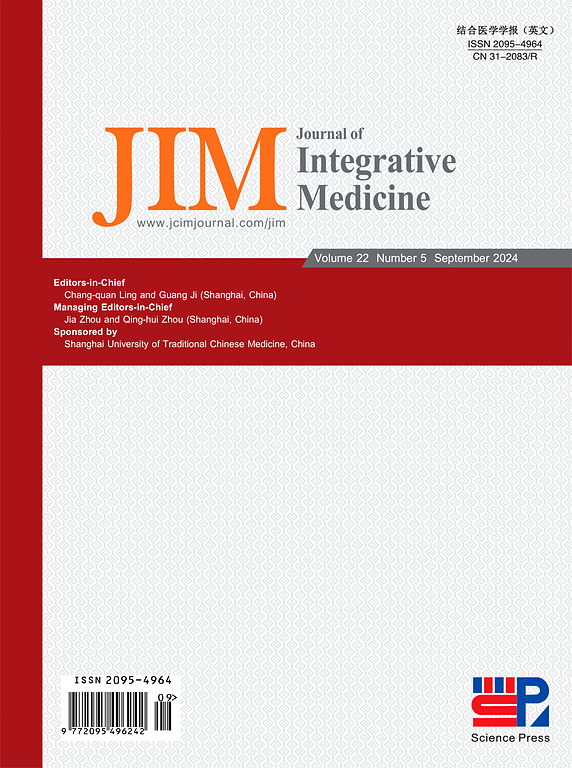Hypno-cardiac physiology: Aiming for an organised study of the physiological effects of hypnosis on the cardiovascular system
IF 4
2区 医学
Q1 INTEGRATIVE & COMPLEMENTARY MEDICINE
引用次数: 0
Abstract
Hypnosis is a promising tool in the management of various conditions, such as anxiety and chronic pain. Preliminary studies have shown that hypnosis can directly affect the cardiovascular system, as it increases parasympathetic activation and reduces sympathetic activity. However, the literature related to the effects of hypnosis on cardiovascular health is scarce, mainly due to misconceptions about hypnosis among researchers and medical professionals. This opinion paper examines the role that hypnosis may play in cardiovascular health, highlighting the physiological mechanisms behind it. The evidence suggests that hypnosis has both direct (e.g., changes in the activity of the autonomic nervous system) and indirect (e.g., changes in healthy behaviours) effects on the cardiovascular system; however, further studies are needed to properly define its mechanisms of action and its applicability in improving cardiovascular health. Thus, this opinion paper advocates the adoption of the term “hypno-cardiac physiology” to identify a new research area that gathers experts from neuroscience and cardiovascular science with the joint aim of seeking further understanding of the effects of hypnosis on the cardiovascular system. The adoption of a dedicated term to identify the study of the cardiovascular response to hypnosis will encourage its implementation in cardiovascular health interventions, promoting awareness of its effects among the public and the healthcare community, and promoting the formation of dedicated multidisciplinary research groups and dedicated educational training for healthcare professional interested in its applications.
Please cite this article as: Leo DG, Keller SS, Proietti R. Hypno-cardiac physiology: Aiming for an organised study of the physiological effects of hypnosis on the cardiovascular system. J Integr Med. 2025; 23(5):457–461.
催眠-心脏生理学:旨在有组织地研究催眠对心血管系统的生理影响。
催眠是一种很有前途的治疗各种疾病的工具,比如焦虑和慢性疼痛。初步研究表明,催眠可以直接影响心血管系统,因为它增加副交感神经的激活,减少交感神经的活动。然而,关于催眠对心血管健康影响的文献很少,主要是由于研究人员和医学专业人员对催眠的误解。这篇观点论文探讨了催眠在心血管健康中可能发挥的作用,强调了其背后的生理机制。有证据表明,催眠对心血管系统有直接影响(如自主神经系统活动的改变)和间接影响(如健康行为的改变);然而,其作用机制及其在改善心血管健康方面的适用性还有待进一步研究。因此,本文主张采用“催眠-心脏生理学”一词来确定一个新的研究领域,该领域汇集了神经科学和心血管科学的专家,共同目的是进一步了解催眠对心血管系统的影响。采用一个专门的术语来确定对催眠的心血管反应的研究,将鼓励在心血管健康干预中实施催眠,提高公众和卫生保健社区对催眠效果的认识,并促进成立专门的多学科研究小组,并为对催眠的应用感兴趣的卫生保健专业人员提供专门的教育培训。Leo DG, Keller SS, Proietti R.催眠-心脏生理学:旨在有组织地研究催眠对心血管系统的生理影响。集成医学[J];打印前Epub。
本文章由计算机程序翻译,如有差异,请以英文原文为准。
求助全文
约1分钟内获得全文
求助全文
来源期刊

Journal of Integrative Medicine-Jim
Medicine-Complementary and Alternative Medicine
CiteScore
9.20
自引率
4.20%
发文量
3319
期刊介绍:
The predecessor of JIM is the Journal of Chinese Integrative Medicine (Zhong Xi Yi Jie He Xue Bao). With this new, English-language publication, we are committed to make JIM an international platform for publishing high-quality papers on complementary and alternative medicine (CAM) and an open forum in which the different professions and international scholarly communities can exchange views, share research and their clinical experience, discuss CAM education, and confer about issues and problems in our various disciplines and in CAM as a whole in order to promote integrative medicine.
JIM is indexed/abstracted in: MEDLINE/PubMed, ScienceDirect, Emerging Sources Citation Index (ESCI), Scopus, Embase, Chemical Abstracts (CA), CAB Abstracts, EBSCO, WPRIM, JST China, Chinese Science Citation Database (CSCD), and China National Knowledge Infrastructure (CNKI).
JIM Editorial Office uses ThomsonReuters ScholarOne Manuscripts as submitting and review system (submission link: http://mc03.manuscriptcentral.com/jcim-en).
JIM is published bimonthly. Manuscripts submitted to JIM should be written in English. Article types include but are not limited to randomized controlled and pragmatic trials, translational and patient-centered effectiveness outcome studies, case series and reports, clinical trial protocols, preclinical and basic science studies, systematic reviews and meta-analyses, papers on methodology and CAM history or education, conference proceedings, editorials, commentaries, short communications, book reviews, and letters to the editor.
Our purpose is to publish a prestigious international journal for studies in integrative medicine. To achieve this aim, we seek to publish high-quality papers on any aspects of integrative medicine, such as acupuncture and traditional Chinese medicine, Ayurveda medicine, herbal medicine, homeopathy, nutrition, chiropractic, mind-body medicine, taichi, qigong, meditation, and any other modalities of CAM; our commitment to international scope ensures that research and progress from all regions of the world are widely covered. These ensure that articles published in JIM have the maximum exposure to the international scholarly community.
JIM can help its authors let their papers reach the widest possible range of readers, and let all those who share an interest in their research field be concerned with their study.
 求助内容:
求助内容: 应助结果提醒方式:
应助结果提醒方式:


